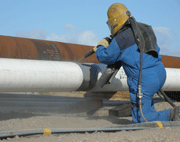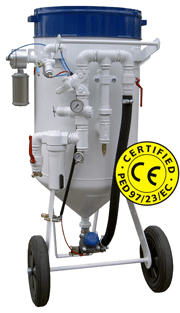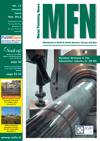E-Archive
Articles
in Vol. 13 - January Issue - Year 2012
Safer Blasting Because Of Strict Rules And Legislation

Blasting

Blast pot
As an independent manufacturer, Gritco is specialized in the design, development and production of professional air blast units. Ever since the company's beginning in 1990, the equipment is fitted with a high level of quality, innovation and durability. Together with twenty years of experience and dedication, this makes for an unprecedented level of air blasting quality and an extraordinarily long-lasting air blast chain. Through their extensive dealer network, Gritco products are sold across the whole of Europe and beyond.
Any one working with machinery knows it’s never without risks. Therefore, an increasing number of rules and regulations have been issued concerning the safety level of technical appliances. This is off course, in order to avoid accidents as much as possible. In this respect, it is important for employers to know the responsibility for the technical safety of industrial appliances rests more and more upon their own shoulders. One of the rules states clearly that the employer is solely responsible for the actual and correct execution of the periodical check-ups of the used machinery.
According to (blasting equipment manufacturer Gritco’s) managing director Sander van der Made, "Non compliance of the (many!) rules may cost a company the proverbial arm and a leg. Entrepreneurs should be very aware of the insurance companies’ common policy in cases of non-compliance: none or only partial compensation in case of accidents! Furthermore, the rules concerning blast equipment do not only apply to the pressure vessel as such but to the complete assembly."
Non- or partial compliance can have painful consequences
Practice shows many companies/entrepreneurs are unfamiliar with the "complete machine" rule for blasting equipment. They are therefore easily and unknowingly in non-compliance with the rules and the corresponding severe consequences of this conduct. So one of Van Der Made’s goals is to inform all concerned in the blasting business these days of the strict rules that apply to blasting equipment. A summary:
• The European Work Equipment Directive states that machinery may not present any danger to the employee.
• The European Machinery Directive demands that manufacturers clearly state the safety level of the machinery by means of the CE mark.
• The European Pressure Equipment Directive 97/23/EC (PED) applies especially to blast pots. However, this directive doesn’t only concern the pressure vessel (as is a common belief). The rules apply to the assembly as a whole. A type of approval by a notified body is needed when the maximum operating pressure times the volume exceeds 200 (Ps x V > 200)
Unannounced check up for EC approval and CE certificate
How do these rules work in practice? That’s quite a story. Van der Made explains "Professional blast pots are constructed in accordance to module B+C1. The B represents the ’EC type approval’ and the C, ‘the conformity to type’. This rather hazy formula means that the safety level of the blast pot meets all the rules of the Pressure Equipment Directive. This module will ‘withstand’ an unexpected check by a so called NoBo (Notified Body) on the working site." Besides the EC type approval, the blast pot needs to have a CE-certificate. This certificate includes: a. model type; b. serial number; c. modules; and d. the respective names and addresses of the notifying body. Van der Made’s Gritco-equipment is certified by DNV (Det Norske Veritas).
Clearly visible safety features
A blast pot (assembly) that has been produced and certified according to the Pressure Equipment Directive can be recognized by the following:
• Type plate of the blast pot’s manufacturer showing the number of the notifying body
• Type plate of the pressure vessel’s manufacturer showing the number of the notifying body
• Certificate of the blast pot’s manufacturer stating the used modules plus numbers and the notifying body plus number. Just a certificate of the pressure vessel manufacturer is not sufficient!
Approval for Commissioning: a supplement on the pressure equipment directive
Unlike new machines, the Approval for Commissioning is not (yet) institutionalised on a European scale. Each individual member state has its own rules and legislation. The responsibility rests upon the user, not the manufacturer.
The Dutch situation: According to the Netherlands Approval for Commissioning, approval is required in case the design pressure times the volume exceeds 1000, or: Ps x V = > 1000. In this case, a notified body (NoBo) has to check if the machine is connected and used in a proper manner. The manual and the CE-certificate (according to PED 97/23/CE) will definitely have to be presented. Of course, Gritco’s blast pots come with these important ingredients.
Periodic Reassessment: one more supplement on the pressure equipment directive
Like the Approval for Commissioning, the Periodic Reassessment is also not institutionalised at a European level. Each member state has its own rules and legislation. The responsibility rests upon the user, not the manufacturer.
The Dutch situation: Just like all other working appliances, blast pots must be periodically reassessed. In case the design pressure times the volume exceeds 1000, or: Ps x V = > 1000 this reassessment has to be executed by a Notified Body (NoBo). When this outcome is less, the reassessment can be executed as the owner/user sees fit. For obvious safety reasons, the original manufacturer or distributor is usually called upon to perform this task.
For Information:
Gritco Equipment BV
Klompenmakerstraat 16d
2984 BB Ridderkerk, The Netherlands
Tel. +31.180.412855
Fax +31.180.418218
E-mail: info@gritco.com
www.gritco.com



























